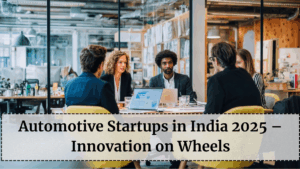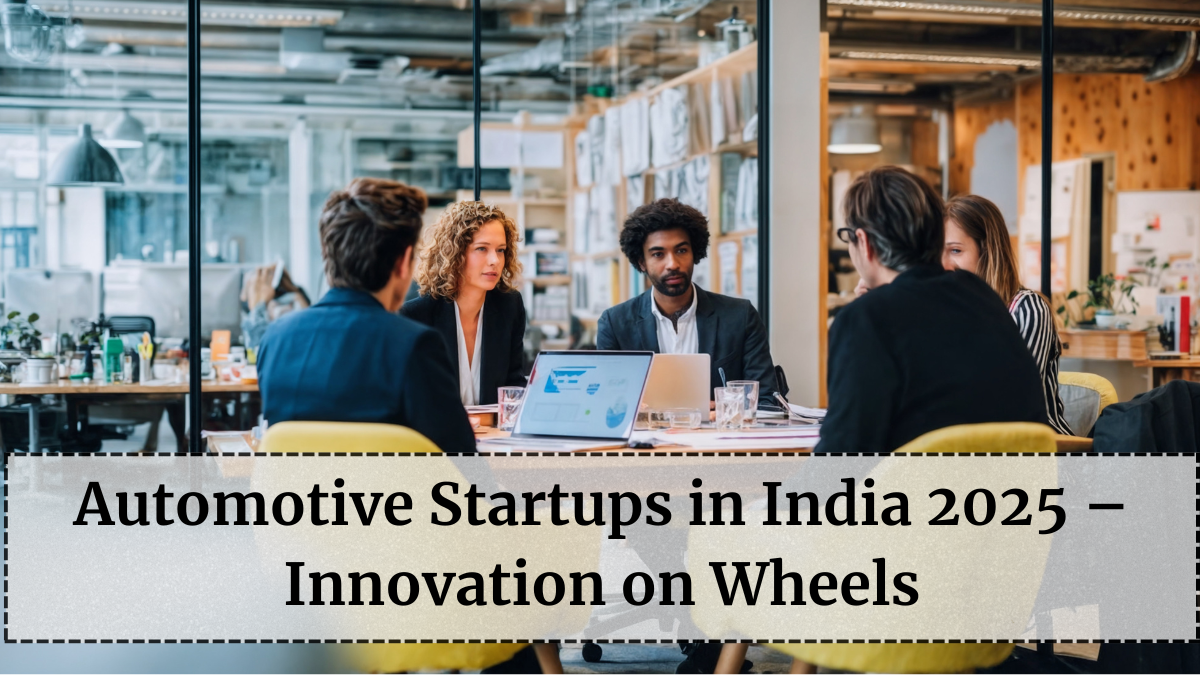India’s automotive landscape is experiencing its most exciting phase in history. By 2025, the country has become a global innovation hub for electric vehicles, smart mobility, and automotive technology. Leading this transformation are hundreds of automotive startups — from EV makers to AI-driven fleet managers — redefining how India drives, commutes, and sustains mobility.
Supported by government initiatives, rising investor interest, and a strong talent pool of engineers, these startups are pushing boundaries in design, performance, connectivity, and clean energy. Here’s an in-depth look at the automotive startup ecosystem powering India’s next-generation transport revolution.

The Rise of India’s Automotive Startup Ecosystem
A Nation on the Move
In 2025, over 500 active automotive startups are working across segments — electric mobility, connected cars, autonomous technology, and renewable energy integration. The focus has shifted from mere manufacturing to software-defined, data-driven mobility solutions.
The Make in India and Startup India programs have accelerated this growth, helping startups scale through tax incentives, PLI schemes, and research grants.
Market Momentum
According to NITI Aayog, India’s EV and mobility startup market is projected to exceed $25 billion by 2030, with 2025 marking the most dynamic growth period. This momentum is fueled by three key factors:
-
A surge in EV demand and battery innovation.
-
Urbanization and smart city mobility needs.
-
Investor confidence in sustainability-focused ventures.
Top Automotive Startups Leading India’s Innovation in 2025
1. Ola Electric – Powering India’s EV Revolution
Ola Electric has evolved from scooter manufacturing to a full-fledged EV ecosystem builder. In 2025, the company is setting up India’s largest gigafactory in Krishnagiri, focusing on battery cell manufacturing and solid-state R&D.
Its popular scooters — Ola S1 Pro and Ola S1 Air — dominate the two-wheeler EV segment, while its upcoming electric car is expected to debut by late 2025.
2. Ather Energy – Performance and Intelligence Combined
Bengaluru-based Ather Energy continues to lead in connected two-wheeler innovation. Its scooters offer AI-powered dashboards, regenerative braking, and OTA updates.
In 2025, Ather is expanding into international markets and setting up Ather Grid 2.0, India’s fastest EV charging network with 1,000+ new stations.
3. Euler Motors – Electrifying Last-Mile Logistics
Euler Motors specializes in electric cargo vehicles built for India’s e-commerce boom. Its vehicles are now used by Amazon, Flipkart, and BigBasket for sustainable deliveries.
In 2025, Euler introduced its new HiLoad 2.0 with a 170 km range, fast charging, and advanced telematics for fleet tracking — making it a top choice for logistics startups.
4. Log9 Materials – Revolutionizing Battery Tech
A deep-tech startup from Bengaluru, Log9 Materials is pioneering graphene-based fast-charging batteries. Its InstaCharge technology enables EVs to charge in under 15 minutes while lasting 10 years.
In 2025, Log9 is collaborating with fleet operators and defense manufacturers to develop extreme-temperature batteries, ideal for India’s climate.
5. BluSmart Mobility – India’s First All-Electric Ride-Hailing Fleet
BluSmart has redefined shared mobility with its 100% electric cab fleet operating in Delhi NCR and Bengaluru. It offers zero-cancellation rides and in-app sustainability tracking for users.
BluSmart’s 2025 expansion includes 20,000 EVs and 4,000 charging points, making it one of India’s largest green mobility networks.
6. Simple Energy – Efficiency Meets Elegance
Known for its sleek Simple One electric scooter, this Bengaluru-based startup focuses on performance and battery range. The 2025 model boasts a 300+ km range, solar charging, and a swappable battery design — addressing India’s long-standing range anxiety.
7. Triton EV – Made in India, for the World
Triton EV, an Indian-American startup, has opened an EV manufacturing hub in Gujarat to produce electric trucks, buses, and SUVs. The company’s Model H SUV and electric trucks are already attracting global attention for their luxury and durability.
8. Minus Zero – India’s Autonomous Vehicle Pioneer
Minus Zero, a Bengaluru-based AI startup, is developing India’s first fully autonomous vehicle prototypes. Its ZPod concept leverages vision-based AI (not LiDAR), allowing cost-effective self-driving capabilities suited for Indian roads.
In 2025, the startup is partnering with universities to test AI navigation in real-world conditions across Bengaluru and Hyderabad.
9. EVage Motors – Building Modular Electric Trucks
EVage Motors is redefining commercial vehicle manufacturing with modular architecture inspired by aerospace engineering. Its FR8 truck is built for scalability — easy to assemble, light, and energy-efficient.
In 2025, EVage is supplying fleets to Amazon India and Delhivery, expanding its operations nationwide.
10. Yulu Mobility – Smart Urban Commuting
Focused on micromobility, Yulu offers smart electric bikes for short-distance city travel. Integrated with the Yulu app and Battery-as-a-Service (BaaS) model, it’s reducing congestion and pollution in major metros.
Yulu’s partnership with Bajaj Auto ensures high production capacity and reliable performance.
Emerging Automotive Tech Trends Among Startups
AI-Powered Fleet Management
Startups like Vecmocon and Raptee Energy are integrating AI-based telematics systems for predictive maintenance, driver behavior analysis, and real-time data optimization.
Battery Swapping & Recycling
Companies such as Battery Smart and Lohum Cleantech are revolutionizing EV energy through battery reuse, swapping, and recycling systems — critical for reducing EV waste and cost.
Sustainable Materials & Manufacturing
Innovators like Tadpole Projects are converting vintage petrol vehicles into EV retrofits, promoting sustainable reuse. Meanwhile, startups are adopting 3D-printed composite parts and eco-friendly materials for lightweight manufacturing.
Connected Mobility Platforms
Integration of IoT dashboards, over-the-air (OTA) updates, and vehicle tracking is now standard for most EV startups, allowing vehicles to continuously learn and improve performance.
Government Support and Startup Incentives
India’s FAME-II, PLI for ACC Batteries, and Startup India initiatives are providing tax rebates, grants, and infrastructure support to mobility innovators.
Key Policy Highlights for 2025:
-
100% FDI allowed in EV manufacturing.
-
5% GST on EVs and components.
-
Battery recycling guidelines and second-life usage framework.
-
State-level subsidies for EV startups in Tamil Nadu, Karnataka, and Maharashtra.
These reforms are encouraging a new wave of local manufacturing, research, and export opportunities.
Challenges for Automotive Startups
Despite their rapid rise, startups still face challenges such as:
-
Supply chain dependency on imported lithium and semiconductors.
-
Charging infrastructure gaps in semi-urban and rural markets.
-
High R&D costs for battery and AI innovation.
-
Talent shortage in EV-specific engineering domains.
However, with collaborative ecosystems and global partnerships, India’s innovators are turning these challenges into opportunities.
The Road Ahead – India’s Mobility Startups Go Global
By 2030, Indian automotive startups aim to not just serve domestic needs but export EVs, components, and AI mobility solutions to Southeast Asia, Africa, and Europe.
As the world moves toward decarbonization, India’s startups are proving that innovation, affordability, and sustainability can coexist. From small scooters to autonomous trucks, these companies are not just building vehicles — they’re building the future of transportation.
FAQs
Which is the top automotive startup in India in 2025?
Ola Electric, Ather Energy, and BluSmart Mobility lead India’s EV startup sector with large-scale production and smart mobility solutions.
Are automotive startups profitable in India?
Yes. With government incentives, EV demand, and fleet partnerships, several startups have reached profitability or global funding stages by 2025.
What sectors are automotive startups focusing on?
They are working across EV manufacturing, battery innovation, AI mobility, charging infrastructure, and shared mobility.
How is the government supporting automotive startups?
Through PLI schemes, FAME-II subsidies, GST cuts, and research grants that encourage innovation and domestic production.
What’s the future of Indian automotive startups?
By 2030, India is set to become a global exporter of EVs and mobility software, driven by sustainable, tech-led startups.
Click here to know more.
